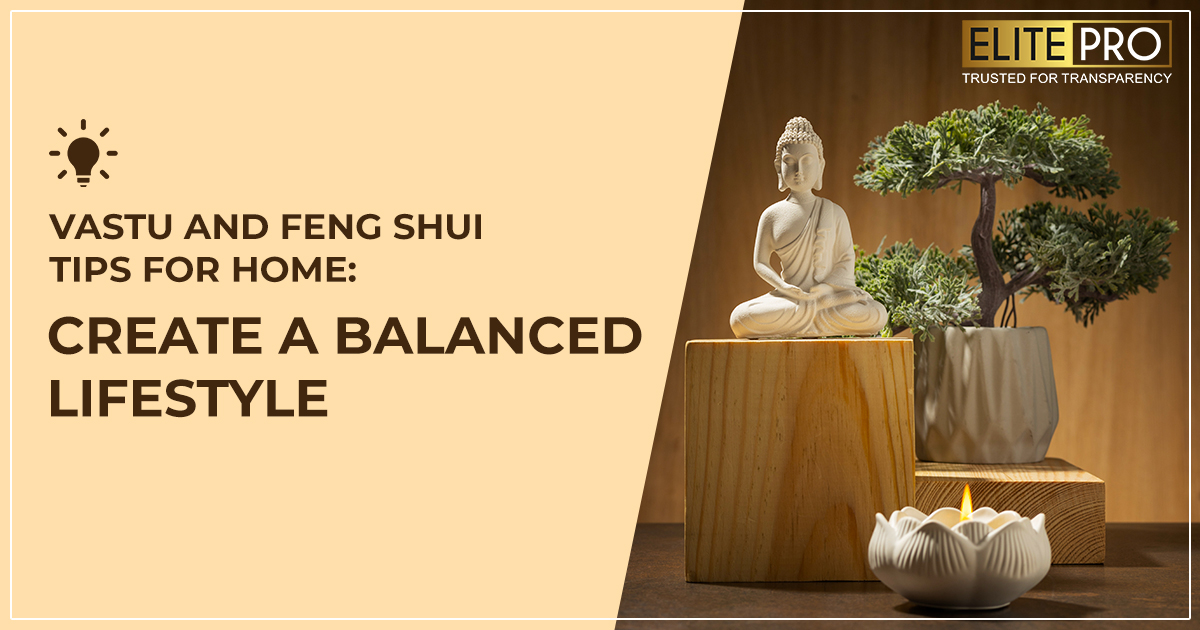
Vastu and Feng Shui Tips for Home: Create a Balanced Lifestyle
Vastu and Feng Shui are ancient architectural and design principles that originated in India and China, respectively. These philosophies focus on creating a harmonious and balanced environment within the home to promote well-being and prosperity. By incorporating Vastu and Feng Shui principles into your home, you can create a living space that supports a balanced lifestyle and positive energy flow. In this blog, we will explore some essential Vastu and Feng Shui tips for the home and how they can contribute to a balanced lifestyle.
What is Vastu Shastra and its Significance in Real Estate?
Vastu Shastra is an ancient Indian architectural science that emphasizes the harmony between individuals and their living or working spaces. The term 'Vastu' refers to the physical environment, while 'Shastra' translates to science or knowledge. The main objective of Vastu Shastra is to create a harmonious and balanced living or working environment in order to promote health, wealth, and prosperity.
In the context of real estate, Vastu Shastra holds significant importance as it greatly influences the design and layout of residential and commercial properties. Developers and architects often consider Vastu tips for home while planning and constructing buildings to ensure that the spaces are conducive to the well-being and success of the occupants. The principles of Vastu Shastra encompass various aspects of architecture, including the orientation of the property, placement of rooms, selection of building materials, and even the arrangement of furniture. For example, the proper orientation of the main entrance and positioning of key rooms such as the kitchen, bedroom, and study are believed to have a profound impact on the occupants' overall well-being and success.
What is Feng Shui and its Significance in Real Estate?
Feng Shui is a traditional Chinese practice that focuses on creating harmonious surroundings to promote the flow of positive energy, or qi. This ancient art and science consider the layout, design, and orientation of a space to enhance the well-being and success of its occupants. In real estate, Feng Shui is often taken into account when designing, selling, or purchasing properties.
The significance of Feng Shui in real estate lies in its potential to attract positive energy and promote a sense of balance and harmony within a space. Many homebuyers and property investors believe that a property with good Feng Shui will bring them good fortune, health, and prosperity. Furthermore, incorporating its principles in real estate can help create an inviting, calming atmosphere that can appeal to potential buyers and enhance the overall value of a property. By considering the principles of Feng Shui in real estate, properties can be designed and positioned in a way that maximizes positive energy flow, ultimately enhancing the well-being and satisfaction of the occupants.
Vastu Tips for Home:
1. Entrance: The entrance of the home is considered the point from where energy enters the space. It should be well-lit, clutter-free, and inviting. Placing a beautiful piece of artwork, a vibrant plant, or a doormat color vastu oriented near the entrance can attract positive energy into the home.
2. Living Room: The living room is a space for socializing and relaxation. According to Vastu, the living room should be located in the North or East direction of the house. Placing the furniture in a circular or square arrangement or flowing water painting Vastu can promote conversation and harmony among family members and guests.
3. Bedroom: The bedroom is a place of rest and rejuvenation. Vastu recommends placing the bed in the southwest direction of the room with the head facing south or east. This arrangement is believed to promote better sleep and overall well-being. Additionally, using calming colors and soft lighting in the bedroom can create a peaceful ambiance.
4. Kitchen: In Vastu, the kitchen is considered the heart of the home. It is important to keep the kitchen clean, organized and well-ventilated. Placing the stove in the southeast direction and keeping the kitchen clutter-free can enhance the flow of positive energy in the space. Moreover, the direction of pooja ghar is also an integral part of the Vastu-compliant home.
Feng Shui Tips for Home:
1. Clutter-Free Space: According to Feng Shui, clutter can block the flow of energy in the home. Clearing clutter and organizing the space can create a sense of ease and harmony. It is advisable to declutter regularly to maintain a balanced environment. It is one of the important Feng Shui tips for money luck.
2. Five Elements: Feng Shui emphasizes the balance of five elements - wood, fire, earth, metal, and water. Incorporating these elements into different areas of the home can create a harmonious energy flow. For example, using plants or wooden furniture for the wood element and adding a water feature for the water element can enhance the balance in the space.
3. Natural Light and Air: Maximizing natural light and fresh air in the home is essential in Feng Shui. Opening windows, using sheer curtains, and incorporating mirrors can help to bring in positive energy and create a sense of spaciousness.
4. Art and Decor: The use of art and décor based on Feng Shui for good luck and wealth can enhance the flow of energy in the home. Choosing artworks that evoke positive emotions and arranging them strategically can promote a sense of peace and balance.
Conclusion
Incorporating Vastu and Feng Shui principles into the home can lead to a more balanced and harmonious lifestyle. By paying attention to the energy flow, layout, and design elements of the living space, one can create an environment that supports physical, mental, and emotional well-being. Whether you are looking for a residential property in Gurugram or looking to make adjustments to your current living space, the application of Vastu and Feng Shui can help you create a balanced and nurturing environment for yourself and your family.






